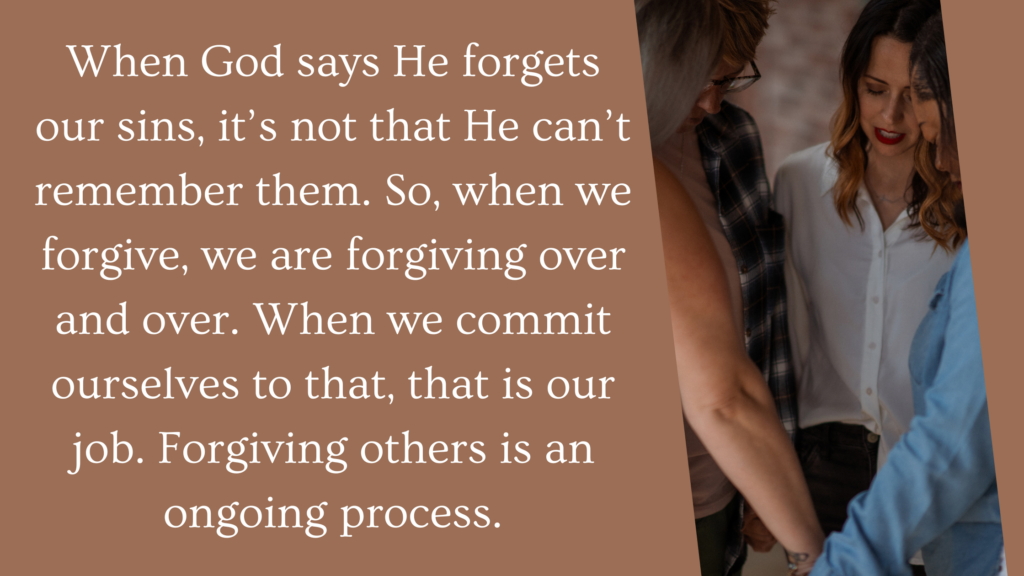Forgiving others who have caused us pain can be an incredibly challenging and uncomfortable process. It’s natural to feel hesitant, even resistant, to extend forgiveness, especially when we fear it might diminish the significance of the hurt we’ve experienced or somehow condone the wrongdoing.
However, within the framework of biblical teachings, forgiveness is not about excusing or forgetting the offense; rather, it’s a conscious decision to release the grip of resentment and anger from our hearts.
Forgiving others is deeply intertwined with our relationship with God in the Christian faith. We embark on this journey with Him, drawing strength from His love and grace as we navigate the complexities of human emotions and interactions. As challenging as it may be, choosing to forgive aligns with the teachings of the Bible and reflects the unconditional forgiveness extended to us by God.
By the way, what if I told you your feelings aren’t inherently bad or sinful? You don’t need to fear or suppress them. They can be a guide. If you’re interested, I have a free 3-day study on living by faith while processing emotions. Check it out here!
What is Forgiving Others
Forgiveness was one of the hardest things for me to process through. So many thoughts came to me.
“Does this mean that if I forgive someone it makes everything right?”
“If I forgive this person, am I letting them off the hook?
It hurt too much to think I had to “be okay” with this person or situation.
However, after learning more about forgiveness, I understand it’s not about dismissing what happened but forgiving the debt owed to me.
Let’s keep going.
First, we must understand there is no limit to which we are to forgive. We don’t get to decide who is worthy of forgiveness and who is not. Despite what they have done or may do, we are called to forgive those who hurt us.
Matthew 18:21-22 says, “Then Peter came to Jesus and asked, “Lord, how many times shall I forgive my brother who sins against me? Up to seven times?” Jesus answered, “I tell you, not just seven times, but seventy-seven times!”
Peter asked Jesus if forgiveness was to be offered seven times. The Jewish rabbis at the time taught that forgiving someone more than three times was unnecessary, citing Amos 1:3-13 where God forgave Israel’s enemies three times, then punished them.
When Jesus responded that forgiveness should be offered four hundred and ninety times, far beyond that which Peter was proposing, it must have stunned the disciples who were listening. Although they had been with Jesus for some time, they were still thinking in the limited terms of the law (they were under the law because Jesus didn’t go to the cross yet) rather than in the unlimited terms of grace.
Christians are only capable of this type of forgiving spirit because the Spirit of God lives within us. It is He who provides the ability to offer forgiveness over and over, just as God forgives us over and over.
This makes it clear that if we are forgiven the enormous debt of sin against a holy God, how much more should we be eager to forgive those who sin against us, who are just as sinful as they?
Why is It Important to Forgive Others
Forgiveness holds significant importance in the Bible for several reasons:
- God’s Commandment: The Bible teaches forgiveness as a commandment from God. In Matthew 6:14-15, Jesus instructs his followers to forgive others if they want to receive forgiveness from God. This reflects the principle of reciprocity in forgiveness.
- Reflection of God’s Character: Forgiveness mirrors the character of God. Throughout the Bible, God is portrayed as merciful and forgiving. His forgiveness of humanity’s sins through Jesus Christ serves as the ultimate example of forgiveness.
- Relationship Restoration: Forgiveness facilitates (makes the way for) reconciliation and restores broken relationships. In 2 Corinthians 5:18-19, the apostle Paul describes how God reconciled humanity to Himself through Christ, emphasizing the importance of reconciliation in relationships.
- Freedom from Bitterness and Resentment: Holding onto grudges and resentment can lead to bitterness and emotional bondage. The Bible warns against the dangers of harboring unforgiveness, emphasizing the need to let go of past hurts for one’s own emotional and spiritual well-being.
- Model for Love: Forgiveness is an expression of love. In Ephesians 4:32, believers are encouraged to forgive others as God forgave them, highlighting forgiveness as a fundamental aspect of Christian love and unity.
Overall, forgiveness is essential in the Christian faith as it aligns with God’s character, fosters reconciliation and restoration, and promotes emotional and spiritual health.
Forgiving Others: Trust and Reconciliation
I’m going to use the word “reconciliation” in terms of trust because that is the fruit of a relationship that has trust. When we talk about forgiveness, that is a one-person thing that is between me and the Lord. That is a decision that I can make without anybody else involved. That is a place that I can come to without anybody else involved.
There’s this “Christianese” thinking of forgive and forget, but that’s not Bible. When God says He forgets our sins, it’s not that He can’t remember them. So, when we forgive, we are forgiving over and over. When we commit ourselves to that, that is our job. Forgiving others is an ongoing process.
When it comes to trust, my go-to verse is 2 Corinthians 7, which talks about Godly sorrow that leads to repentance, and it breaks down what true repentance looks like. When we are looking to someone to reconcile a relationship, we need to see the fruit of repentance.
It looks like a complete change to prove that they are willing to pivot. If you are desperate for reconciliation or want trust after you’ve decided to walk through forgiveness, I would encourage you to meditate and study 2 Corinthians 7 and be aware of the fruits of forgiveness. Be aware of Godly sorrow and earthly sorrow because it’s easy for someone to say, “I’m so sorry that I hurt you.”
But repentance means sitting with them in the pain you’ve caused. That’s the fruit of someone who has Godly sorrow that has brought them to a place of repentance. Repentance is a safe place for us, and it protects us. Many women are shamed into trusting people too quickly because they think that’s what the Bible requires and what God requires of them.
But biblically, trust is restored through repentance; reconciliation is restored by way of repentance, and there’s fruit to that. So that’s the difference – forgiveness isn’t a one-person thing. It’s me and God. When it comes to trust, both people must be willing to let God do what He wants to do in their lives.
Emotional Boundaries with Forgiveness
Often, we equate forgiveness with welcoming people back into their lives. But reconciliation takes two people – you can’t have reconciliation if the other person is not going through repentance.
Therefore, what does it look like when we’re entering back into these relationships to then begin to have boundaries but still welcome connection?
I approach boundaries as fences. I look at them as my home—I let people into my front yard, my home, my living room, and my bedroom—the sacred Holies of Holies. Forgiving others requires us to set emotional boundaries for healing.
When you view boundaries not as this one wall that you must set repeatedly but as levels of access to you, you have a little bit more freedom to have boundaries. For me, if I’m looking at someone who has harmed me and I want to maintain a relationship because they’ve proven that reconciliation is possible with them, I would see how they operate with specific access to you.
Let somebody into your front yard and see what they do; see how they act and how you feel. That doesn’t mean you’re cutting them off, it means that you have changed how much access that they have to you. That’s really empowering for both you and them.
It’s mercy for them because you’re saying, “I don’t want you to be in a place where you’re going to harm me again, so out of love for you I’m going to set this boundary because I want you to be your best self.” I’m going to set this boundary because I need to know if you are capable of not harming me with this specific access. So, I don’t like to view boundaries as hard walls, even though they are hard lines.
How to Practically Walk Out the Process of Forgiving Others
How do I even begin to start this process? I can say it with my mouth that I forgive them, but how do I walk in faith through my actions and in this process of forgiveness?” What would you say to them?
Be willing to forgive (forgiving others) repeatedly and really have grace with yourself. Understand that it is a journey and approach it as such. The biggest hangup is that we say we forgive someone, and then something triggers us again. We’re humans. Pain and trauma leave a mark on us; they wound us.
There are times when the person who hurt us hits a wound again and we realize we need more healing and that we need to offer more forgiveness. So, give yourself grace and run to the Father when that wound is brushed up against and hit or poked. And understand that pain is not evidence that no work has been done. A trigger is not proof that you haven’t made any progress.
You may not be harboring any unforgiveness, but your body may be holding more that needs to be given to the Lord. He’s also doing stuff with that relationship that you may not see.
So, follow the peace of God when it comes to interacting with that person and have wisdom about how much you interact with them. Knowing what you can tolerate and understanding that because you limit your interactions doesn’t mean that you’re limiting how you love your neighbor. So those are some practical things you can do because it is hard.
Forgiveness looks different even though it gives us similar outcomes. We get healing and freedom, but there’s so much nuance there. Give yourself over to God and the journey of forgiveness, and know that it’s okay to take your time to get to that place of willingness.
Sometimes, we think our walk with Christ is going to be easy. Then, when we encounter hard life things, we think we’re not following the Lord. We get the impression that forgiveness should be easy, and when it’s not, we question the point. It’s important to have grace and compassion for yourself and to walk it out with the Lord about forgiving others.
As a culture, we are distancing ourselves from the mercy of God, and that is why we’re seeing an increase of labeling difficult people “toxic.” That’s why we’re seeing an increase of isolating ourselves and cutting people off, because we have distanced ourselves from mercy in our understanding of the mercy that we are given.
It’s the realization that I am not perfect. I do things every single day that the Lord must forgive. I expect God to forgive me, and I sit underneath that forgiveness every single day. So, it’s not that I’m trying to make myself this non-human person or denounce my humanity.
But God said, “Jessica, my mercy is for you. It’s not for you to hoard it and make you feel better about your shortcomings and flaws. My mercy flows in you so that I can go through you so that you, out of the understanding of what I’ve done for you, can do to others.” And that’s the gospel of forgiveness—not that we, in our own might, are forgiving other people.
It’s not that we are wrestling and white-knuckling for forgiveness. Faith is what motivates our understanding and belief in the revelation of what God has done for us. And that revelation is what we cling to every time it’s hard. When we have to forgive over and over again, we don’t claim to our mind, we don’t cling to our resolve, and we cling to the revelation of God’s mercy in our lives.
We want mercy extended to us, and we forget to extend mercy because of the mercy the Lord has shown us.
God, in His kindness, is with you now.
He is not going to leave us on our own with the things that He requires of us. Feel the kindness of the Lord on your decision and even if you’re at the place where you’re not quite willing or you are willing or you’re in the middle of it, know that the kindness of God is with you, and it is what’s guiding you through.
It’s a process, but it’s not impossible.
You don’t have to do it alone—nobody expects you to do it alone—and you don’t have to be any less human to receive God’s healing. God wants you to be fully who you are—all human. He knows who we are. So let Him meet you and let Him breathe into your forgiveness and your willingness.

Bible Verses About Forgiving Others
Colossians 3:13
Bear with each other and forgive one another if any of you has a grievance against someone. Forgive as the Lord forgave you.
Proverbs 28:13
Whoever conceals their sins does not prosper, but the one who confesses and renounces them finds mercy.
Psalm 32:5
Then I acknowledged my sin to you and did not cover up my iniquity. I said, “I will confess my transgressions to the LORD.” And you forgave the guilt of my sin.
James 5:16
Therefore confess your sins to each other and pray for each other so that you may be healed. The prayer of a righteous person is powerful and effective.
Luke 6:37
Do not judge, and you will not be judged. Do not condemn, and you will not be condemned. Forgive, and you will be forgiven.
For more verses on healing, go to my healing scriptures!
Prayer for Forgiveness
Father, thank you for your mercy over my life. Thank you for showing me every step I need to take. Thank you for going before me and being my rear guard. I know I can come to you and work through the pain I feel in my heart in my pain. I can trust you with my life because you made me in your image. My heart is still hurting from the pain, but I know you have forgiven me, and I am now committing to forgiving others who have hurt me. I am not alone because you are always there, leading me with kindness and gentleness. Forgive me of any anger or pain I caused others in this process of healing. Thank you for showing me how to give my pain to you. I love you. In Jesus’ name, amen!






It’s a tear-jerking, every-day lesson